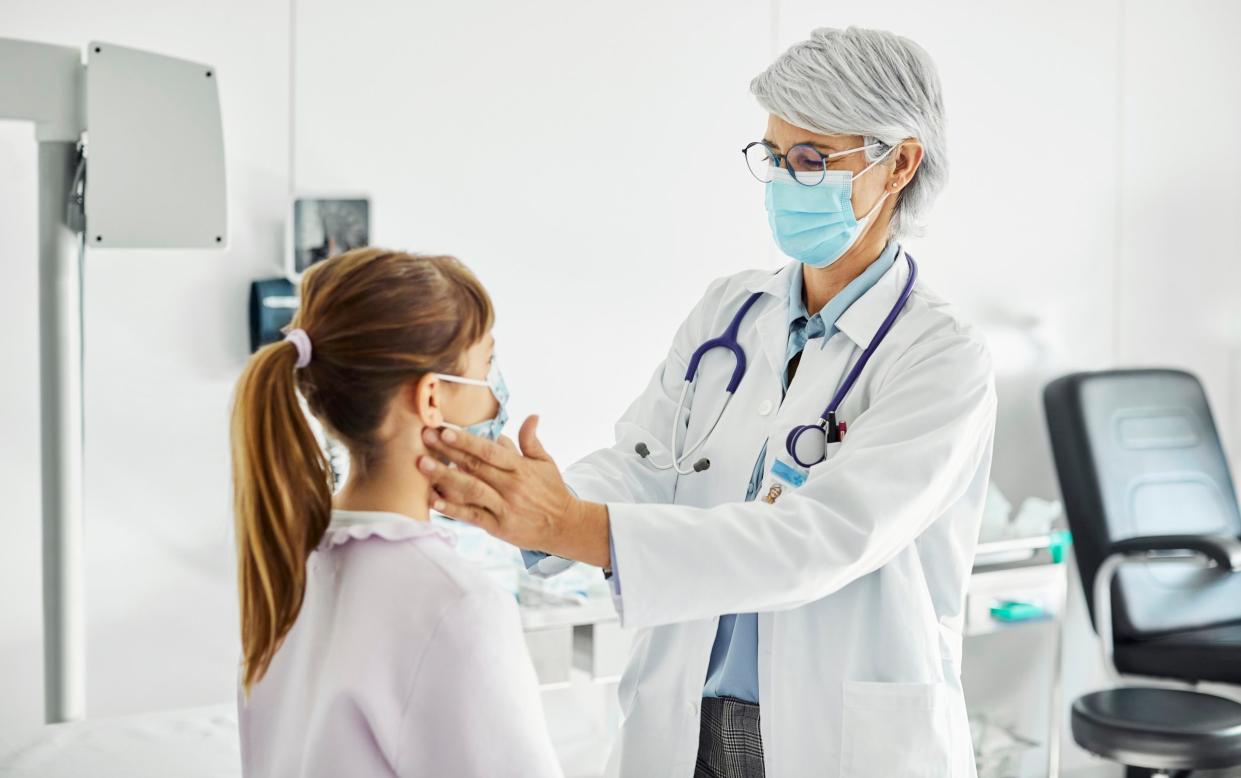GPs bring back masks as whooping cough cases rise

The whooping cough outbreak has prompted GPs to bring back masks in their surgeries.
At least five babies have died this year in England and Wales from the infection, dubbed the “100-day cough”, and officials are concerned about its spread, with almost 3,000 confirmed cases so far.
Some general practices are now asking patients to wear a face covering when attending an appointment or while travelling to the surgery in a return to Covid-style measures.
And at least one surgery has advised its patients to wait outside before being called to appointments.
Parkside Family Practice in Reading, Berkshire, has told all patients they must wear a mask again.
“For infection control purposes, please do wear a face mask when coming to our surgery,” a statement on its website said.
The Parkview Surgery in Uxbridge, Middlesex, told patients: “If you have a face to face appointment, the doctors ask that you wear a face mask to your appointment.”
West Hampstead Medical Centre in north west London has emailed all its patients warning of “a local upsurge in measles and whooping cough”.
“If you have a cough, please wear a mask in the practice,” it warned, adding that anyone with symptoms should book a telephone call but be “available to attend in person within 30 minutes”.
It added that parents should then “notify the reception you have arrived but wait outside to be called in when your appointment starts”.
The Weardale Practice in Stanhope, Bishop Auckland, is also asking all patients who have symptoms of a respiratory infection to wear a mask when attending the practice in updated guidance.
NHS updates infection control guidance
The moves follow updated NHS England infection control guidance earlier this year in the wake of a measles outbreak and increasing whooping cough cases. It advised reinstating mask-wearing measures where appropriate.
The guidance says “if possible or tolerated the patient should wear a surgical face mask in communal areas” to avoid spreading the highly contagious diseases to others.
The decision on mask-wearing is made by local service providers depending on how bad infection rates in the area are.
Whooping cough is as contagious as measles and more so than Covid-19, with young children who are not protected at the greatest risk from serious complications.
Dr Philippa Kaye, a London-based GP, told the Mail on Sunday patients with suspected whooping cough should wear a mask while travelling.
The outbreak has been widespread across the country but the south east and London have seen the most cases so far.
The UK Health Security Agency (UKHSA) has confirmed that five babies – all under three months of age – died after contracting the infection in the first three months of the year.
There have been reports of further fatalities since, including Evie-Grace Lewis, who died last week at just 15 days old.
It is the highest number of deaths caused by whooping cough in a decade and experts fear more will follow as case numbers could hit 40-year highs.
The surge in cases has been attributed to circulation of the disease being slowed during the pandemic and lockdowns, as well as the decreasing uptake of the whooping cough vaccine, particularly among pregnant women.
The latest figures show just 37 per cent of pregnant women in London had been vaccinated by the end of last year, down from 61 per cent before the pandemic.
Across the country, take-up fell by 19 per cent in pregnant women, while take-up among under-fives fell by 4 per cent.
The NHS recommends all pregnant women are vaccinated against whooping cough between 16 and 32 weeks to protect their baby in the first weeks of its life before it can get its own vaccinations.
Confusion over vaccine responsibility
However, experts claim there is confusion about whether the GP or antenatal team should be responsible for offering the jab.
The NHS website says the whooping cough vaccine, first made available for pregnant women in 2012, is available from the GP and some antenatal clinics, where expectant mothers go for check-ups during pregnancy and “may be offered the vaccination”.
Dr David Elliman, a consultant at Great Ormond Street Hospital, said “a lack of clarity as to who is responsible” for giving the vaccine to expectant mothers was the most probable reason behind low uptake.
“There is no evidence that the low uptake of whooping cough vaccine in pregnancy is due to women declining the vaccine,” he said. “More likely is a lack of clarity as to who is responsible for giving it – primary care or maternity.”
The vaccine is 92 per cent effective in protecting a newborn baby if given to the mother while pregnant, providing protection before the baby can get its six-in-one vaccination at eight weeks old.
Immunity from the jab passes through the placenta to protect newborn babies in their first weeks of life.

